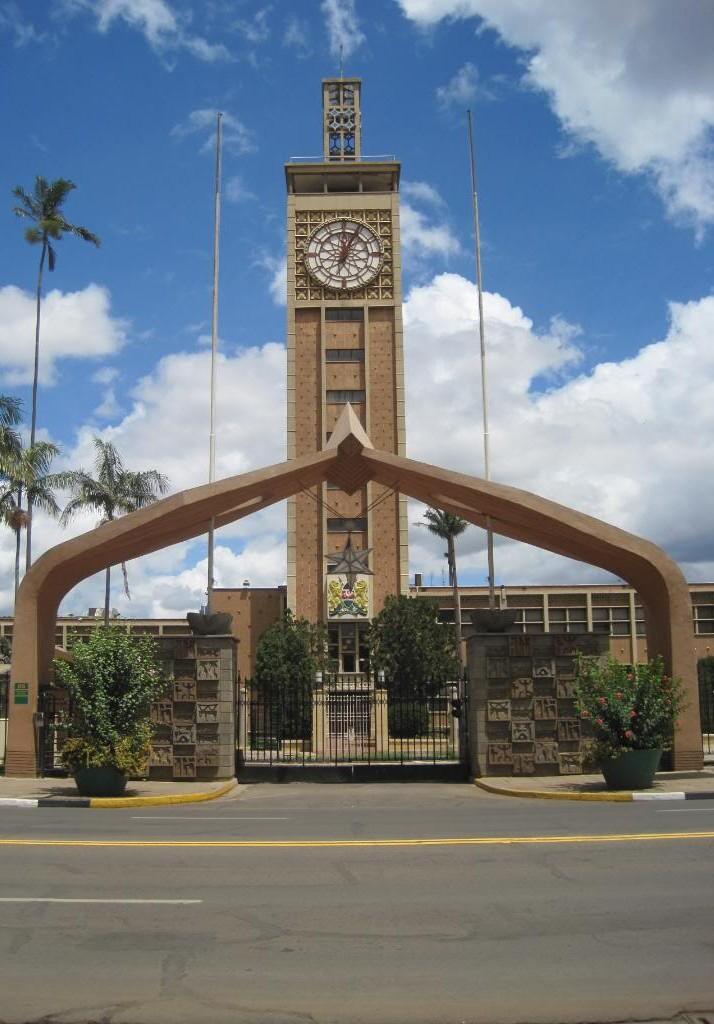It’s time to axe Kenya’s big dick politics

There’s one huge theme that cuts across all Kenyan politics and it’s not ethnicity and it’s not land.

Kenya’s parliament building.
[Once you’ve read this, read Ngala Chome’s response Not just big dicks: Kenya’s real cross-cutting theme is class. And then Nyabola’s response to that Kenya: It really is about dicks.]
On 22 February, readers of The Star newspaper were treated to the front-page headline which screamed: “Gideon Moi is uncircumcised, says DP Ruto”.
This story was sparked by an observation about Gideon Moi’s foreskin that Deputy President William Ruto allegedly made at a political event in support of his favoured candidate for the hotly-contested Kericho by-election.
There has been some debate as to what exactly Ruto meant as he spoke in Kalenjin, and whether it was a comment about circumcision or a euphemism to refer to Moi as a young pretender. But either way, one thing is clear: We have finally reached a point at which we can no longer pretend Kenyan politics is anything more than a never-ending dick-measuring contest.
The received wisdom about politics in Kenya has always been that the biggest problems facing the country are land and ethnicity. Politicians deploy these concerns to mobilise voting blocks. And in both academia and journalism, these two ideas generally form the bedrock of how the country is analysed and what solutions are proposed.
However, this understanding of Kenya’s politics is based on a flawed premise which sees the problems of elite men as the problems of the country as a whole. They are not. In fact, these two “major” struggles are, at heart, primarily contests of patriarchy – of mimi ni ndume (‘I am a bull’) politics in which men butt heads for local or national supremacy.
[See: Kenya has become a “bandit economy”, says Chief Justice Willy Mutunga]
A cock and bull story
The history and politics of Kenya look fundamentally different when the central referent object of the analysis is a woman. Consider ethnicity. Volumes have been written about the impact of ethnicity, including full length texts on how identities are constructed, mobilised and deployed. But what rarely gets noticed is how deeply patriarchal both the practice and analysis of ethnicity are.
For instance, the argument that the animus between Kenya’s ethnic groups is insurmountable overlooks the fact that, for millennia, women have been married off between ethnic groups. The only reason their ethnic identities are erased is that most communities in Kenya are patrilineal. One only has to look at the two leading political families – the Kenyattas and the Odingas – to see this truth in motion. This phenomenon also speaks to the fact that ethnicity is in no way essential or rigid, but rather a highly malleable concept that is easily exploited in pursuit of various political goals.
Similarly, the idea that land is the most important problem in Kenya overlooks the fact that women constitute just over half the country’s population yet are constrained by custom from owning land. Very few communities will allow women to independently purchase or inherit land with no obstacles, and the legal struggles over property laws are symptomatic of the lengths men will go to in order to keep it this way.
Consider, for example, the status of women’s property laws in marriage. The initial draft of the 2013 Matrimonial Property bill contemplated an automatic 50-50 split of property in the event of divorce. But during the debate, it was re-tabled with amendments that required “proof of contribution”. This is one of the many ways in which women’s rights in marriage are trampled on, because it is difficult to prove to a legal standard the monetary value of non-financial labour that women put into marriages. For instance, what’s the monetary value of the many times a wife had sex although she didn’t want to because it made her husband feel better on his way to work?
The final version of the bill (opposed by 28 of the 34 female legislators) also restricted matrimonial property to “movable and immovable property jointly owned by both spouses”. This means that if the man registers the household bank account under only his name, it is protected from any divorce proceedings. Or if the husband inherits land and does not add his wife’s name to the deeds, a woman cannot legally claim it as part of marital assets.
How can the biggest problem in Kenya be land when the majority of the population is not free to own it?
[See: Women’s rights violations don’t need to kill or maim to still be violations]
Giving the patriarchy the shaft
At the same time, statistics on domestic violence in Kenya are telling. In a 2014 demographic and health survey, 23.8% of women between the ages of 15 and 19 reported having suffered physical or sexual violence at the hands of a partner. This number rises to a startling 42.6% for women between 40 and 49. Moreover, these numbers hold pretty much steady across all kinds of other factors – across ethnic groups, wealth disparities, urban vs. rural.
In fact, domestic violence is arguably the only truly national issue in Kenya that cuts across all other divides. But because it is a problem that primarily affects women, not only is it not on the national political agenda but even political analysts don’t give it the attention it deserves.
[See: Wangari Maathai was not a good woman. Kenya needs more of them.]
It is not enough to just observe that Kenya’s politics is elitist. We must also contend with the fact that it is overwhelmingly patriarchal. All of Kenya’s largest ethnic groups are crippled by toxic, violent masculinities that poison the national dialogue and crowd out constructive discourse on anything else.
Speak to Kenyan women in the public sphere and they will tell you that it is Kikuyu men that express the most toxic attitudes towards the candidacy of Martha Karua or Wangari Maathai. That it is Somali men who pressure Somali women not to run in favour of other men in the clan. And that it is Kamba, Luhya, Luo or Kalenjin men who beat their sisters and daughters who offer to run for office.
What are presented as the main problems of Kenya are really just contestation between groups of elite men measuring in the public sphere what should really be left to the country club dressing room.
Men are the biggest obstacles to the political advancement of women in their own communities, but women can be part of the problem too. When a woman criticises the private morality of a female political figure, she is upholding a patriarchal system that subjects women in public to higher moral standards than men. When we propagate mimi ni ndume politics by refusing to acknowledge or celebrate the contributions of women in politics, we are reifying the argument that women are “flower girls” who do no substantive work. When we encourage women politicians to kowtow to big men instead of building alternative centres of power, we reinforce the system. When we uncritically accept men as “natural leaders” without interrogating their motives or intentions, we bolster the patriarchy.
To avoid the seemingly inevitable descent into perdition in the coming 2017 election, Kenya needs a new politics – right down to the ways in which we think about who is fighting whom, and for what. It is high time we axe Kenya’s big dick politics. Or, in the words of Chimamanda Ngozi Adichie, in order to save Kenya, we should all – men and women – be feminists.
Nanjala Nyabola is a Kenyan writer, humanitarian advocate and political analyst, currently based in Nairobi, Kenya. Follow her on twitter at @Nanjala1.







Very apt and real analysis of what ails Kenya…..Kenya needs a systemic shift in narratives, that of men dick-measuring and dragging Kenyans along. Women too, need to start flexing their influence and independence, of mind, body and spirit. Domestic violence, for bearing the awful statistics that it does, can be used as a base for mobilising women politically to challenge male hegemony that is Kenya’s politics
Excellent article!
1. Land & ethnicity are big issues.
2. Customary constraints are not legal constraints. A woman can own land if she wishes to. Inheritance rights are at the discretion of whoever writes the will. Forcing inheritance distribution is against freedom
3. Vague concepts of emotional labour do not trump physical purchase so yes proof of contribution is necessary
4. Domestic violence affects men at 3/4 the rate it affects women so no it is not a women’s issue
5. Electoral violence applies to everyone equally
6. Women are free to have whatever opinions they want to have on female candidates. The expectation of female solidarity is childish and groupthink
7. No, feminist identity politics is not what is needed to cure ethnic identity politics. It’s just a different flavour
I guess you make quite a point. All over the world, ‘that building’ (image) hosts too many ‘big dickies’ 🙂
Really interesting piece. Would be interesting to study voting patterns as well, and see how(if at all) husbands influence the decision that their wives make at the polls. Also, more research on why very few women run for office (there have been many studies done in the West and very few here).
women have made it in kenyan scenario and gender was not the issue karua ngilu to mention just those and they gave men a run for their money
Excellent piece. And long overdue. As an academic, I am weary of arguments about moral ethnicity versus political tribalism which, even with the best of intentions always reconstitutes the constitutes the civic sphere as male. This essay is excellent because it has been true from the colonial period until the present day and it crosses all ethnic boundaries.
Nothing original here
I am not entirely sure the biggest (pun intented lol) problem really is big dick posturing really or even overly patriarchal macho systems.
Say voting along tribal lines. As long as Kenyans generally do that it is hard to imagine real positive change – with a man or woman holding the mantle.